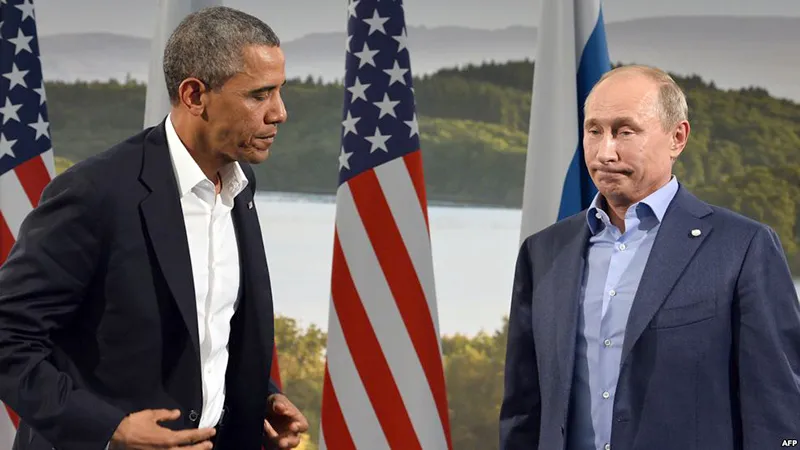-
CENTRES
Progammes & Centres
Location

In a sign of rapidly deteriorating US-Russia ties, Russian President Vladimir Putin passed an order suspending an agreement with the United States - signed in 2000 by then Secretary of State Hillary Clinton - for the disposal of 34 metric tonne of weapons-grade plutonium.
This is another marker in the downward trajectory of relations between Moscow and Washington.
The document said that the deal was being suspended, "as a result of unfriendly actions by the US towards the Russian Federation".
President Putin submitted a bill to the Russian parliament setting a series of pre-conditions for the US for the agreement to be resumed.
These include reduction of US military infrastructure and troops in countries that joined NATO after September 1, 2000, and lifting of all American sanctions against Russia and compensation for the damage they have caused.
The US - as well as the European Union - imposed a series of sanctions against Russia following the annexation by Moscow of Ukraine’s southern Crimea peninsula in 2014, and Russia’s support for separatists in eastern Ukraine.
On the other side, the US suspended talks with Russia over the Syrian crisis.
The US imposed a series of sanctions against Russia following the annexation by Moscow of Ukraine’s southern Crimea peninsula in 2014
Washington said Moscow had not lived up to the terms of last month’s ceasefire agreement, which has since collapsed.
Russia said it regretted the decision, accusing the US of trying to shift the blame on to Russia over the failed deal.
It was, therefore, no surprise when earlier this week the State Department decided to called off talks between Washington and Moscow on a new ceasefire in Syria.
The ceasefire deal forged earlier this month - which few ever believed would work - started falling apart almost immediately, punctuated by a mistaken US airstrike on Syrian troops, the Russian and Syrian attack on a UN aid convoy, continued fighting by some US-backed rebels, and Syrian jets refusing to stop pounding civilian targets.
Almost a year after Russia began its air campaign to help Bashar al-Assad’s government crush opposition rebels, downward spiral in Syria continues even as Syrian and Russian jets continued to pound Aleppo.
A US-Russia brokered ceasefire fell apart last month, after Russia and Syria launched the air offensive against opposition rebels in a bid to push them out of major urban areas.
The bombardments have pushed diplomatic engagement between Moscow and Washington to the brink.
It’s unclear what, if any, deal can be struck at this point between Moscow and Washington to end the slaughter of civilians.
Fighting on the ground in the besieged city has been fierce over the past several days, with pro-government forces wresting strategically significant ground from the rebels, while Damascus used its moment of strength to demand that the rebels lay down their arms and leave the city.
Aleppo is where things are taking the most gruesome human toll, with Russian bombs obliterating entire apartment blocks and hospitals while Washington could only threaten to shut down ceasefire talks - to Moscow’s annoyance and seeming amusement.
Washington and Moscow are squaring off in Syria, the Black Sea, the Baltics, and right on through to the hacking of computer networks.
But Moscow is doing most of the jabbing, with the Americans crying foul.
Russian Deputy Foreign Minister Sergei Ryabkov last week dismissed Secretary of State John Kerry’s call for another seven-day ceasefire in Syria, adding that Kerry’s threat to walk away from negotiations was little more than an "emotional breakdown."
Reacting to State Department spokesman John Kirby’s comment this week that Moscow’s bombing runs on Syrian civilians could lead to terror attacks in Russia and Russian soldiers coming home in “body bags,” Maj-Gen Igor Konashenkov, spokesman for Russia’s Defence Ministry, said the comments were “the most frank confession by the US side so far that the whole ‘opposition’ ostensibly fighting a ‘civil war’ in Syria is a US-controlled terrorist international,” using a Soviet-era term.
Meanwhile, some Syrian rebels in and around Aleppo, feeling burned by Washington, are drawing closer to the Nusra Front, Al-Qaeda’s powerful affiliate in the country.
Russia and the US have fundamentally divergent views of the conflict. Russia’s objective is to ensure the survival of the Assad regime, whereas for the US it is the root of Syria’s crisis.
Russia has deftly used its power to challenge the US and has positioned itself as a major beneficiary of the ongoing turmoil.
Putin may have several aims in Syria but the most significant one remains that of projecting Russian power on the global stage and reestablishing Moscow as a credible global power.
It still remains to be seen if he will be successful in his objective.
This commentary originally appeared in Mail Today.
The views expressed above belong to the author(s). ORF research and analyses now available on Telegram! Click here to access our curated content — blogs, longforms and interviews.

Professor Harsh V. Pant is Vice President – Studies and Foreign Policy at Observer Research Foundation, New Delhi. He is a Professor of International Relations ...
Read More +